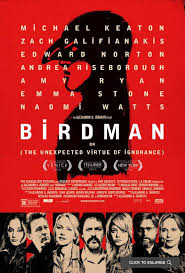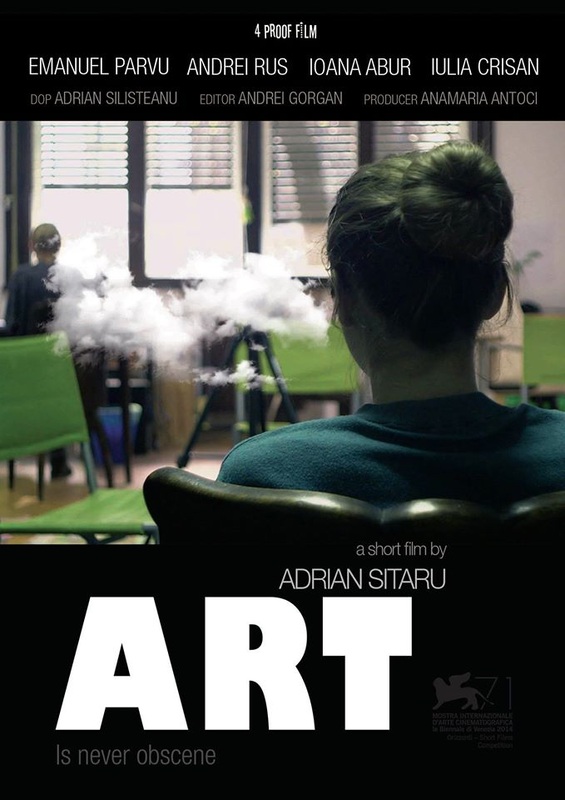|
This review appeared in the Estonian cultural weekly Sirp, and you can read the Estonian version of the review HERE
Below is the original English version: “A Thing Is A Thing, Not What Is Said Of That Thing” In Alejandro González Iñárritu’s Birdman (or the Unexpected Virtue of Ignorance) (Dir. Alejandro González Iñárritu, USA , 2014) this maxim is taped to the dressing room mirror of actor Riggan Thomson (Michael Keaton). A shallow slice of philosophy it may be – the type of phrase that gets trotted out on Facebook and Twitter with tiresome regularity by people desperately trying to appear profound – but it serves as a perfect encapsulation of the tensions at the heart of Birdman, as the trappings of fame and the reality of perception are playfully scrutinized. The film sets it’s stall from the opening moments with Thomson – preparing a new Broadway play that he hopes will legitimise him after spending years playing superhero ‘Birdman’ in Hollywood – meditating whilst floating a few feet off the ground. At odds with what one would associate with your typical American Indie film it immediately plunges us into a world in which reality and fantasy are at battle with one another. It soon becomes apparent that it is one of a number of dichotomies that the film will revel in. On a narrative level the film deals with Riggan’s belief that years playing a superhero has diminished his credibility as an actor and his play – an adaptation of Raymond Carver’s What We Talk About When We Talk About Love – is an attempt to rescue his reputation as being nothing more than Hollywood whore. But when actor Mike Shiner (Ed Norton) comes in to take a supporting role, his attempt to ‘find the truth’ in any role makes Riggan feel even more like a fraud and he begins to question the worth is his search for legitimacy. On one level the film is an exploration of this tension between the desire to be popular and the need to be seen as ‘worthy’. The battle is internalised within Riggan (as the Birdman character talks to him incessantly, urging him to get out of the theatre and return to Hollywood to make Birdman 4) and the point is hammered home when theatre critic Tabitha Dickson appears on the scene and promises to destroy the play, sight unseen, because “…. I hate you. And everyone you represent. Entitled. Spoiled. Selfish.Children. Blissfully untrained, unversed and unprepared to even attempt real art.” One feels that Iñárritu is indulging a certain amount of gleeful revenge in casting the critic in the role of a villain and this sense of the mischievous is apparent in the casting. It’s no secret that the Riggan was written with Michael Keaton – the star of Tim Burton’s Batman movies – in mind but let’s not forget that Ed Norton (in The Hulk), Naomi Watts (in Peter Jackson’s King Kong) and even Zach Galifianakis (in The Hangover franchise) have all had their flirtations with mainstream Hollywood genre cinema. It plays on their star personas with people such as Galifianakis playing against type (his part is effectively a straight role) and adds another level to the constant questioning of the ideas of fantasy and reality. As intriguing as this duality is, the power of the performances themselves should not be dismissed. The supporting cast all do well with Norton’s ‘method’ actor being a fine blend of arrogance and confidence (though his story does seem to end rather abruptly). But it’s Keaton who holds everything together as Riggan, an actor constantly tortured by the threat of his own mediocrity. Keaton brings a nervous energy to a character also on the verge of a collapse, as if he’s going to be ‘found out’ at any moment. It’s a breathless and highly-strung performance in which Keaton manages to be both unlikable and sympathetic. A moment in which his daughter (Emma Stone) devastatingly savages him for having no relevance (“I4 mean who are you? You hate bloggers. You make fun of twitter. You don't even have a Facebook page. You're the one who doesn't exist,”) brings forth his desperate need to ‘be somebody’ yet it is also a tragic moment of someone who realises that life had passed them by. It’s easy to see the film as a satire on the practises of modern Hollywood. While it’s obviously present this is not Iñárritu engaging in biting criticism but giving something more of a world weary sigh. Indeed Birdman is as much as a swipe at those who believe they are above so-called ‘low culture’ as it is those who may be said to aim for the lowest common denominator. This dichotomy between low and high culture is also played out in the aesthetics of the film. Much has been made already of the fact that Birdman is screened in one continuous take. It’s certainly a remarkable technical achievement from cinematographer Emmanuel Lubezki managing to feel organic and natural and avoiding the ‘gimmicky’. It provides a theatrical feel to proceedings (amplifying the fact that it is mainly set in an actual theatre) and the film starts to play with ideas of cinema versus the stage. There is something of a dialectical examination here with the naturalism of the theatre juxtaposed with moments of pure Hollywood excess (one of Riggan’s fantasies involves a battle sequence straight out of any Summer Blockbuster). Is Birdman a better – and therefore ‘more worthy’ film – because it evokes the more legitimately perceived theatrical tradition? Does its use of standard Hollywood tropes somehow make it less cultured? There is a moment when Watts and Amanda Risebourough share a kiss – seemingly out of nowhere – and the incident is not referred to again. In hindsight it seems to be making fun of the titillation inherent in many a Hollywood film and the need to put such scenes in to make them popular amongst a wide demographic. At another point Shiner states that “Popularity is the slutty cousin of prestige,” suggesting that the two are mutually exclusive. Could Birdman itself by either one but never both at the same time? Iñárritu never really seems to come down one way or the other. He instead enjoys positing these self-reflexive questions while exhibiting something of a futility in actually trying to come up with a coherent answer. Birdman is a unique experience in that it is consistently playing games with both the audience and its own form. As a satire of Hollywood and the egos contained within, it’s a fine piece of work that is buoyed by some excellent cinematography and some exceptional performances. But as a piece of cinema – a medium which is perhaps the most prone to accusations of shallowness and falsity – it’s a fascinating treatise on the nature of reality and how the notion of truth is favoured above all. By Laurence Boyce
22 Comments
If you're here, you no doubt already know that I like short films. Hell, I even earn much of my living out of them.
In my current role as Executive Editor of Cineuropa Shorts, I have put together a look at the Best Shorts of 2014 in which the various great and good of the European short film scene choose their best short films of the past year. HERE IT IS for your perusal This little exercise was something that I suggested last year in response to the numerous 'Best Of' lists that spring up at this time of year. Inevitably, there would be loads of lists of features (of which I contributed to quite a few) but they would nary be a word said about shorts. So I decided to suggest a poll of favourite shorts and - lo and behold - some people went for it. In many ways, these kind of lists are reductive. I had to limit the participants to five films and only those of European origin. So it meant that the brilliant US film A MILLION MILES AWAY had to be missed out and I probably had many people umming and ahhing about what to choose. There are so many good shorts - ones that are good for many different reasons - and it seems almost an exercise in masochism to choose an almost arbitrary list. Yet, we're still in a situation where shorts don't get as much coverage as they deserve and any list such as this not only allows us working in the short film world to engage in a bit of dialogue as well as giving some more exposure to some great films. Perhaps 'Best Of' is the wrong word...? The 'Shorts That Struck a Chord in 2014' perhaps? Still, I hope it makes some people think about shorts and want to check them out (and to do that all I can suggest is that people check out their film festivals - and if they don't bring the films, demand to know why!). As for choices. Adrian Sitaru's Arta is just a great work and the others I chose really resonated with me though - to be honest - there are many, many more that would have worked for me. It did become clear that I have lagged behind in my Animation and Experimental watching. Something that I hope to rectify in 2015. So here's to shorts in 2014 and a great deal more good ones in 2015 |
AuthorJournalist. Filmy type person. Likes crisps. Archives
December 2015
Categories |
| Laurence Boyce |
|


 RSS Feed
RSS Feed
